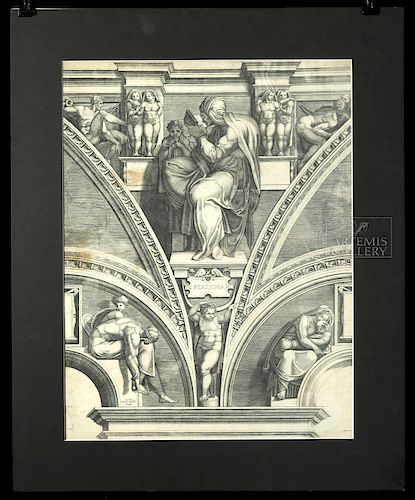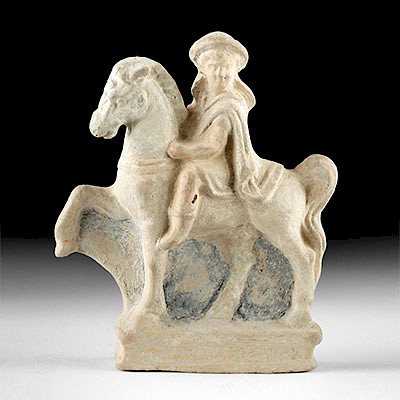16th C. Ghisi Engraving - Persian Sibyl by Michelangelo
Lot 167
About Seller
Artemis Fine Arts
686 S Taylor Ave, Ste 106
Louisville, CO 80027
United States
Selling antiquities, ancient and ethnographic art online since 1993, Artemis Gallery specializes in Classical Antiquities (Egyptian, Greek, Roman, Near Eastern), Asian, Pre-Columbian, African / Tribal / Oceanographic art. Our extensive inventory includes pottery, stone, metal, wood, glass and textil...Read more
Estimate:
$4,000 - $6,000
Absentee vs Live bid
Two ways to bid:
- Leave a max absentee bid and the platform will bid on your behalf up to your maximum bid during the live auction.
- Bid live during the auction and your bids will be submitted real-time to the auctioneer.
Bid Increments
| Price | Bid Increment |
|---|---|
| $0 | $25 |
| $300 | $50 |
| $1,000 | $100 |
| $2,000 | $250 |
| $5,000 | $500 |
| $10,000 | $1,000 |
| $20,000 | $2,500 |
| $50,000 | $5,000 |
| $100,000 | $10,000 |
| $200,000 | $20,000 |
About Auction
By Artemis Fine Arts
May 9, 2019
Set Reminder
2019-05-09 10:00:00
2019-05-09 10:00:00
America/New_York
Bidsquare
Bidsquare : Ancient | Asian | Ethnographic
https://www.bidsquare.com/auctions/artemis-gallery/ancient-asian-ethnographic-4110
Featuring classical antiquities, ancient and ethnographic art from cultures encompassing the globe. All legally acquired, legal to sell. Satisfaction guaranteed. Convenient in-house shipping. Artemis Fine Arts info@artemisgallery.com
Featuring classical antiquities, ancient and ethnographic art from cultures encompassing the globe. All legally acquired, legal to sell. Satisfaction guaranteed. Convenient in-house shipping. Artemis Fine Arts info@artemisgallery.com
- Lot Description
Engraver Giorgio Mantovano Ghisi (Italian, Mantua, ca. 1520-1582 Mantua) after Michelangelo Buonarroti (Italian, Caprese 1475-1564 Rome), "The Persicha Sibyl; from series of Prophets and Sibyls in the Sistine Chapel" (also Persian Sibl). Publisher: Nicolaus van Aelst (Flemish, Brussels 1526-1613, Rome). Ca. early 1570s CE - a 3rd or 4th state (of 5). A strong impression printed on fine laid paper with the watermark of an "anchor in a circle" - very close to Briquet #471, dated to 1527. Giorgio Ghisi’s detailed renderings, including this engraving of the Persian Sibyl, helped to make Michelangelo’s frescoes among the best-known High Renaissance monuments, despite the fact that they were difficult to access. Since the Sistine Chapel ceiling was too large to include on one sheet, Ghisi produced a series of oversize engravings of five sibyls and seven prophets. A strong impression of the Eritrean Sibyl sold for $7,000 at Sotheby's twenty years ago (see below). An incredibly engraving that rarely comes available! Size: sheet measures ~ 21.75" L x 16.875" W (55.2 cm x 42.9 cm)
Inscription: Inscribed in image on a tablet at center: "PERSICHA"; lower left: ".G.MAF. 1540 / Nic.o van aelst for. Romae"
See the Metropolitan Museum of Art's example [Accession Number 26.70.3 (3)] - https://www.metmuseum.org/art/collection/search/367701 Please notice that the Met example's impression seems to be of a similar quality to our example. The Met example is 2nd state; our example is certainly comparable and definitely dates to the 16th century according to an expert with whom we consulted.
Note that Giorgio Mantovano Ghisi's engraving of Michelangelo's "The Eritirean Sibyl", ca. 1570 sold for $7,000 at Sotheby's, New York, 11 May 1995, Lot 56.
Catalogue Raisonne: Boorsch, Lewis and Lewis 159.47.ii; Bellini 1979, p. 136; Bellini 1998, 85.17.ii; Bartsch XV.393.19; TIB 31[15], 55.19
As explained by Boorsch (in Boorsch, Lewis and Lewis 1985, p. 164) the dates of 1540 and 1549 engraved on some of the plates from the series is false. The plates should rather be dated to the early 1570s.
Watermark of "anchor in a circle" may be found in Charles Molse Briquet, "Les Filigranes: Dictionnaire Historique Des Marques De Papier Des Leur Apparition Vers 1282 Jusqu'uen 1600" - illustrated in figures 471 and 472, descriptions on pp. 454-478. As noted, the watermark on the fine laid paper of this engraving is very close to #471 which is dated to 1527.
For further information: Adam von Bartsch Le Peintre graveur. Vienna, 1803, cat. no. 19, p. 393.
TIB The Illustrated Bartsch. Abaris Books, 1978–, cat. no. 19, p. 55, ill.
Paolo Bellini "Incisioni di Giorgio Ghisi" Rassegna di studi e di notizie. 7, 1979, p. 136.
Suzanne Boorsch, R. E. Lewis, Michal Lewis The Engravings of Giorgio Ghisi. The Metropolitan Museum of Art, New York, 1985, cat. no. 47.ii, p. 159, ill.
Paolo Bellini L'opera incisa di Giorgio Ghisi. Bassano del Grappa, 1998, cat. no. 17.ii, p. 85, ill.
Provenance: private Lucille Lucas collection, Crested Butte, Colorado, USA
All items legal to buy/sell under U.S. Statute covering cultural patrimony Code 2600, CHAPTER 14, and are guaranteed to be as described or your money back.
A Certificate of Authenticity will accompany all winning bids.
We ship worldwide and handle all shipping in-house for your convenience.
#134183Note that when looking at the verso of this engraving, one can see that the ink actually cones through the fine paper. This is a sign of a superb impression according to an expert with whom we consulted!A few printing creases above the Sibyl. A stain to base of metope to left of Sibyl. Some old repairs on the verso. Still a very strong impression and quite rare.Condition
- Shipping Info
-
All shipping is handled in-house for your convenience. Your invoice from Artemis Gallery will include shipping calculation instructions. If in doubt, please inquire BEFORE bidding for estimated shipping costs for individual items.
-
- Buyer's Premium



 EUR
EUR CAD
CAD AUD
AUD GBP
GBP MXN
MXN HKD
HKD CNY
CNY MYR
MYR SEK
SEK SGD
SGD CHF
CHF THB
THB
















